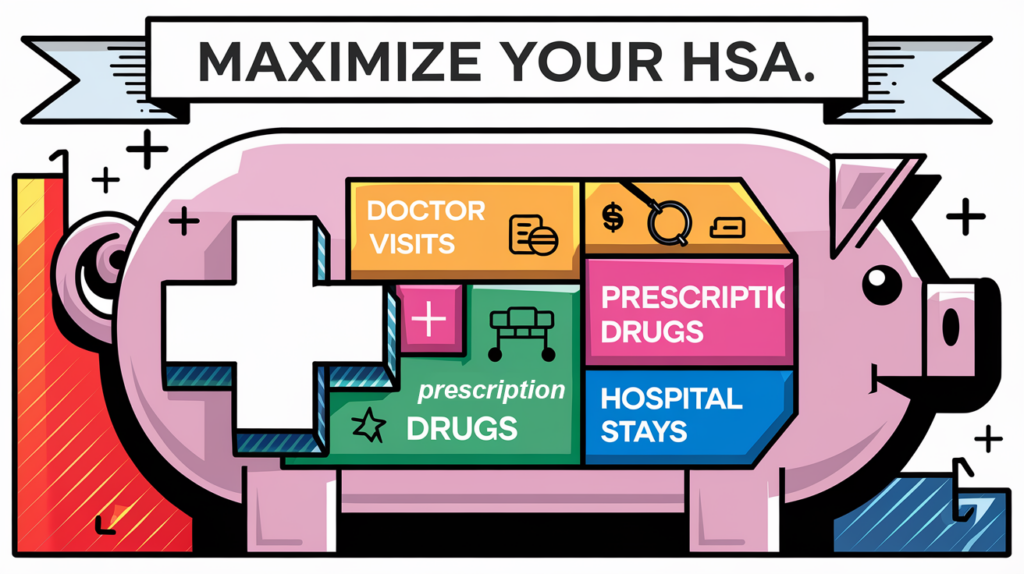A Health Savings Account (HSA) is a powerful tool for managing healthcare costs and building long-term savings. It offers triple tax advantages: contributions are tax-deductible, the money grows tax-free, and withdrawals for qualified medical expenses are also tax-free.
But there’s more to HSAs than meets the eye.
HSA Basics: How it Works
To be eligible for an HSA, you must be enrolled in a High Deductible Health Plan (HDHP). This means you’ll pay more out-of-pocket for medical expenses before your insurance kicks in, but it also comes with lower premiums.
For 2024, the HDHP requirements are:
- Minimum Deductible: $1,600 for individuals / $3,200 for families
- Maximum Out-of-Pocket: $8,050 for individuals / $16,100 for families
HSA Contribution Limits for 2024:
- Individual Coverage: $4,150
- Family Coverage: $8,300
- Catch-Up Contribution (age 55+): $1,000
Key Benefits of an HSA
- Tax Savings: Reduce your taxable income with pre-tax contributions and enjoy tax-free growth and withdrawals for qualified medical expenses.
- Control Your Healthcare Spending: HSAs empower you to make informed decisions about your healthcare costs.
- Flexibility: Use your HSA funds for current medical expenses or save them for future needs.
- Portability: Your HSA goes with you, even if you change jobs or health insurance plans.
- Retirement Planning: After age 65, you can withdraw HSA funds for any purpose (subject to regular income tax). Before age 65, non-medical withdrawals are subject to income tax and a 20% penalty.
Understanding Qualified Medical Expenses
The IRS defines what qualifies as a medical expense for HSA purposes. These include a wide range of costs, such as doctor’s visits, prescription drugs, hospital stays, and even some alternative therapies.
For a complete list of eligible expenses, refer to IRS Publication 502.
Investing Your HSA Funds
Many HSA providers offer investment options, allowing your money to grow beyond a basic savings account. These options typically include mutual funds, ETFs, and other traditional investments.
Important Note: While some HSAs offer “self-directed” options, these are still subject to IRS regulations and do not permit direct investment in assets like real estate, livestock, or cryptocurrency.
Employer Contributions
If your employer offers an HSA, they may contribute to your account. These contributions count towards your annual limit, so be sure to factor them in when planning your own contributions.
Making the Most of Your HSA
HSAs are a valuable tool for anyone looking to manage healthcare costs and save for the future. To maximize your HSA benefits:
- Contribute Regularly: Even small amounts can add up over time, thanks to tax-free growth.
- Understand Qualified Expenses: Ensure you’re using your HSA funds for eligible medical costs.
- Explore Investment Options: Consider investing your HSA funds to potentially outpace inflation.
- Plan for the Long Term: HSAs can be a valuable part of your retirement strategy.
HSAs vs. FSAs
While both HSAs and Flexible Spending Accounts (FSAs) offer tax advantages for healthcare expenses, there are key differences:
| Feature | HSA | FSA |
|---|---|---|
| Fund Rollover | Yes | Generally No (though some employers offer grace periods) |
| Health Plan Requirement | HDHP | Any |
| Ownership | Yours | Your Employer’s |
Frequently Asked Questions (FAQs)
What is the difference between an HSA and an FSA?
While both HSAs and Flexible Spending Accounts (FSAs) offer tax advantages for healthcare expenses, there are key differences:
- HSA funds roll over year to year; FSA funds generally do not.
- HSAs are typically paired with HDHPs; FSAs can be paired with any health plan.
- You own your HSA funds; FSA funds are owned by your employer.
Can I use my HSA to pay for my spouse’s or dependents’ medical expenses?
Yes, you can use your HSA funds to pay for qualified medical expenses for yourself, your spouse, and your tax dependents.
What happens to my HSA if I change jobs?
Your HSA is portable and stays with you even if you change jobs.
Can I have both an HSA and an FSA?
In most cases, you cannot contribute to both an HSA and a general-purpose FSA. However, you may be able to contribute to a Limited Purpose FSA, which covers dental and vision expenses.
Take the Next Step with XOA TAX
HSAs are a valuable tool for anyone looking to manage healthcare costs and save for the future. To maximize your HSA benefits and ensure you’re making the most of this powerful savings vehicle, consider seeking personalized guidance from a qualified financial advisor.
At XOA TAX, we can help you navigate the complexities of HSAs and develop a strategy that aligns with your individual needs and financial goals.
Contact us today for a free consultation:
Website: https://www.xoatax.com/
Phone: +1 (714) 594-6986
Email: [email protected]
Contact Page: https://www.xoatax.com/contact-us/
We look forward to helping you achieve your financial goals!
Disclaimer: This post is for informational purposes only and does not provide legal, tax, or financial advice. Laws, regulations, and tax rates can change often. Please consult a professional advisor for advice specific to your situation.




 anywhere
anywhere  anytime
anytime